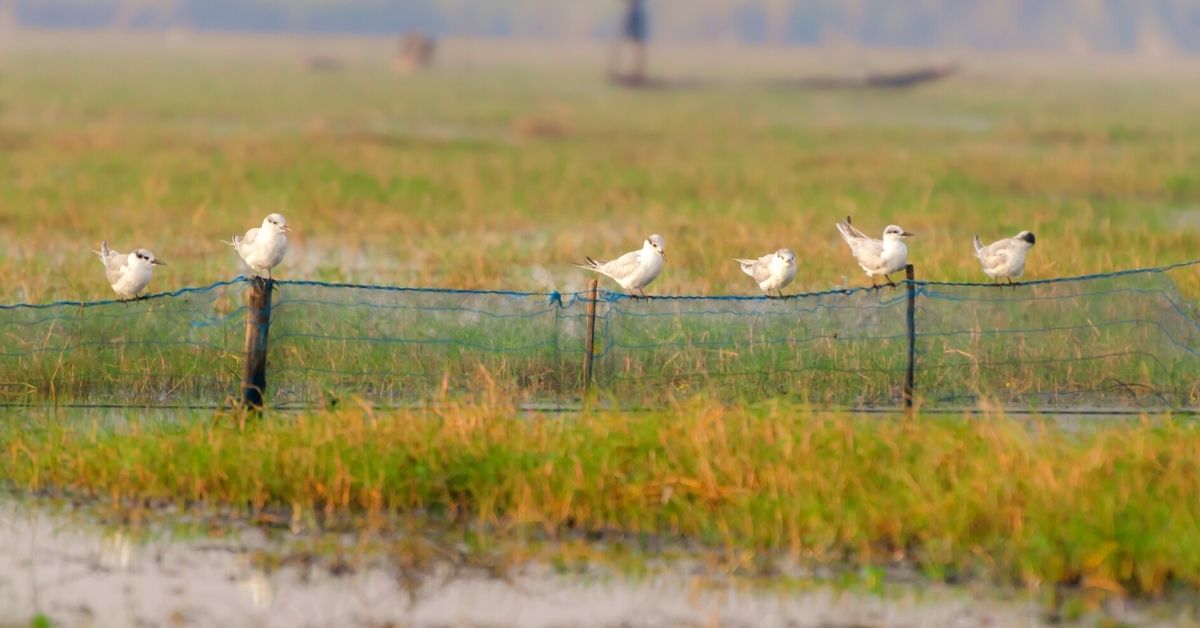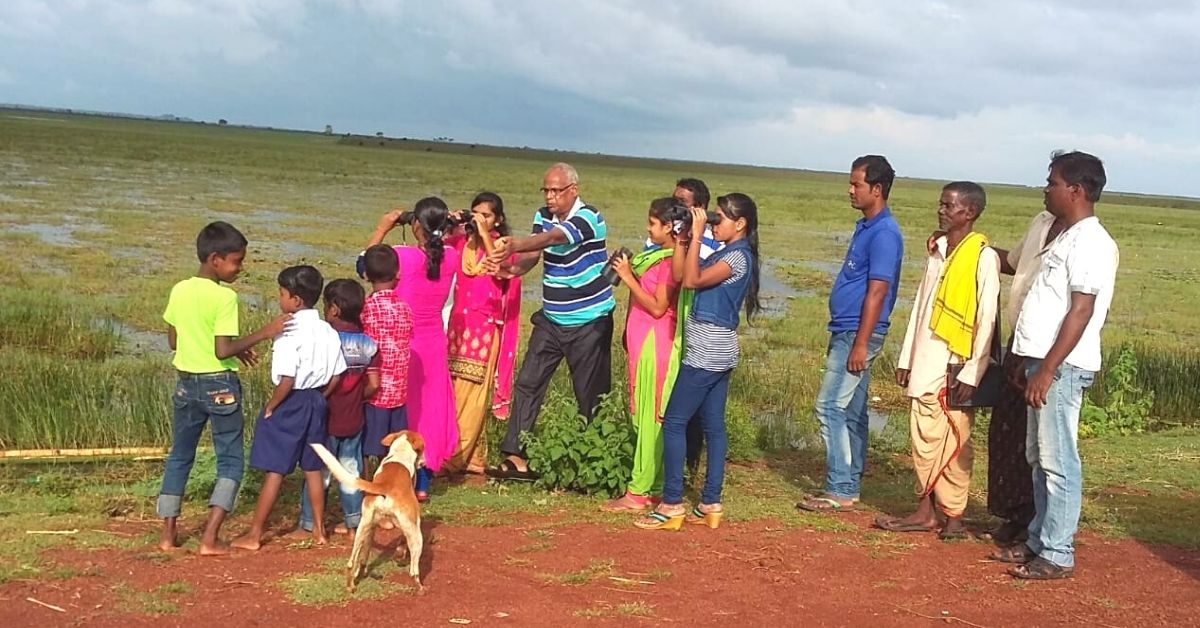Mangalajodi village in Odisha is roughly a 1.5-hour-long journey from the state capital of Bhubaneswar. It is adjacent to the freshwater wetland Chilika Lake, Asia’s largest brackish water lagoon. Along with the entirety of Mangalajodi, this water body supports more than 1,50,000 people from 132 villages around it.
Interestingly, the wetland is also a haven for over 230 species of resident and migratory birds. Visits of birds including the warbler, Pacific golden plover, Himalayan owl and bar-tailed to name a few make the area a heavenly abode for enthusiasts, birders, researchers and explorers. Birds fly thousands of kilometres, from areas as far as Siberia, Caspian Sea, Aral Sea, Lake Baikal, Central Southeast Asia, Mongolia, Russia and Himalayas to breed, nest, and make the wetland their home during winter months.
Despite its significance, for a long time, villagers failed to value the treasure located in their backyard. This was because for generations, they had led a primitive life of surviving on fishery resources and farming. Concepts of environment degradation, bird migration, laws of nature, the ecosystem role and sustainable livelihood more or less remained alien to the residents. The magnificent and massive exotic bird population meant that locals could hunt them and earn a premium in the market. This posed a threat to the existence of birds.
However, the grim picture has transformed over the years, as poachers themselves have become conservators. Hard to believe? The figures prove that from a population of 5,000 birds in the early 1990s, the number has steadily increased to over 5,00,000 in 2021.
From poacher to conservator

This change has come around owing to the efforts of Nanda Kishore Bhujabal, who strived for years to work closely with villagers and help change their mindset. Earlier a poacher himself, Nanda realised his wrong ways during the early years of his life, and this made him bring about a change in others. At present, 25 such ex-poachers work towards bird conservation and as tourist guides for visitors.
The 75-year-old Nanda says, “I used to hunt birds during my youth. It was a common practice, and locals saw nothing wrong with it. It called for an easy earning of Rs 2,000 to Rs 3,000 per hunt. Villagers also poisoned the lake plantation with Furatin at night. When the birds consumed the plants in the morning, they would die. It happened indiscriminately.”
While forest department officials cracked down on such activities, the situation did not improve much.
Nanda says the bird population visiting the villages and vicinity had steadily declined over the years. While in the 60s and 70s, the sky was full of birds, slowly, all that was left was vast and empty blue. The flora and fauna in the wetland reduced, which started having a severe impact on the birds.
“I soon realised the negative impacts of my actions, and the need for environmental conservation. I decided to quit hunting in 1996. I started speaking with villagers I used to hunt with about protecting the birds and stopping the rampant killing,” he says.
Nanda started Sri Sri Mahavir Pakshi Suraksha Samiti, an NGO, for creating awareness about saving birds among villagers. “I used to explain to the villagers that if we continued the act, the birds would go extinct and their marvel and glory could never be witnessed by younger generations. I also interacted with a few researchers to understand the importance of bird conservation and its role in ecological balance,” he adds.
He also instilled fear among the villagers about legal actions under the Wildlife Protection Act, as well as the punishments that poaching and illegal trade of the birds could attract. “I also started working as a forest guard with the support of the forest department,” Nanda says.
A community effort

Slowly and reluctantly, villagers began coming on board. Bhagyadhar Behera, secretary of the NGO, was one such person who understood what Nanda wished to convey. “Nanda said that one day, all the birds will be gone, and there will be nothing to prey on. The quick income from hunting would be dead. The villagers then proposed a challenge to him. They asked him to stop regular poachers from hunting the birds, after which they would follow suit,” he says.
Bhagyadhar says that this condition came as some poachers who were good at hunting earned more than others. “This created competition and economic disparity. The professionals earned about Rs 4,000 from a kill or in a single day. Hence, it needed to stop,” he adds.
Nanda, in 2002, asked 11 such poachers to vow in the name of their religious deity Maa Kalijai and give up hunting. “We all quit as the belief says that disobeying the deity would invite her wrath to the village,” Bhagyadhar says.
Four years later, villagers began seeing results, as birds started venturing near them. “Earlier, the birds stayed away, but as conditions became favourable, they started living closer to human habitations. In 2005, we saw the first set of tourists visiting the village to see the migratory birds. Since then, birds keep flocking, and there has been a steady earning from ecotourism,” he says.
In September 2020, apart from 5 lake birds recorded in Mangalajodi, the Chilika wetland registered 11.4 lakh birds during the season.
Will conserve without monetary benefits

Bhagyadhar says that during peak season, the villagers earn around Rs 50,000, and the money is distributed among the community. “The villagers work as tourist guides or ferry the passengers and even as assistants to the researchers spotting the birds. They practically live with the birds and observe them closely. This helps them share their knowledge with tourists, and explain the behaviour patterns and peculiar characteristics of the birds,” he adds.
He says that about 40 villagers, including 25 ex-poachers, are involved in the activities. Bhagyadar says that the process was riddled with challenges. “For one, it was difficult for us to learn the names of the birds in English, even though we knew them by local languages. Despite such issues, ecotourism as a way of livelihood is helping us earn more. Earlier, we used to kill these birds and earn, but now we save these birds for an income,” he chuckles.
Another conservator, Shiba Behera, says that it is an enlightening feeling to work with scientists and nature lovers. “We are exposed to scientific knowledge about the birds. The interactions certainly help us know more about how nature functions, as well as what role humans play in the conservation process,” he adds.
Nanda says that he has helped 419 poachers quit hunting in the area, and worked with the forest department to include them in various conservation aspects. “They now lead much more comfortable and dignified lives. Earlier, the same villagers lived in fear and were scared to face the society. But now they are respected and have a better place in the community,” he adds.
Bhagyadhar says that plans are to introduce better facilities for tourists. “There are homestays and other basic amenities. The plans are to offer better services and earn more as the government is also supporting the conservation cause through ecotourism,” he says.
He clarifies that earning money is not the sole motive anymore. “Earning money from ecotourism is only a bonus. We will continue to conserve these birds even without earning any income out of it or irrespective of tourists visiting the village. We feel proud to be able to play our part in the environment conservation process,” Bhagyadhar says.
Edited by Divya Sethu
No comments:
Post a Comment